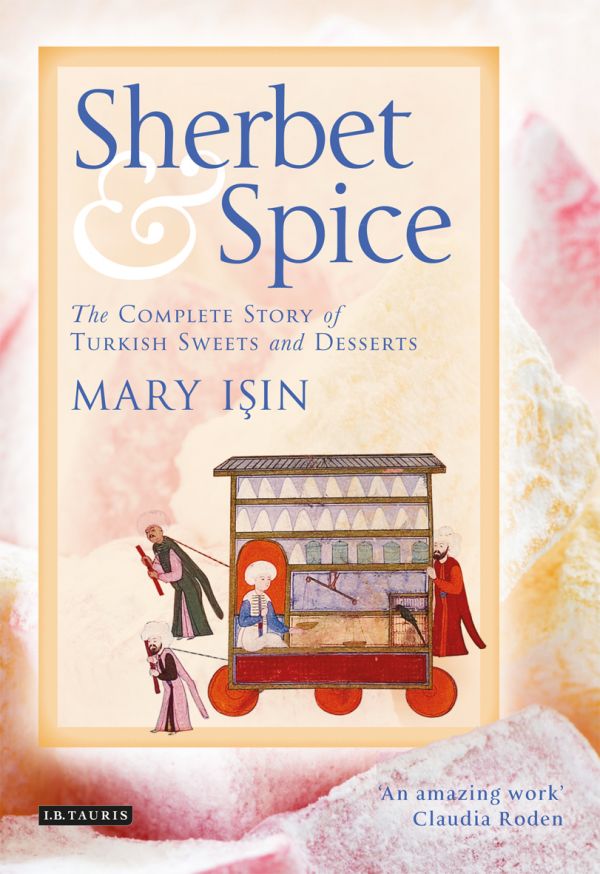Buy or gift a stand-alone digital subscription and get unlimited access to dozens of back issues for just £18.99 / $18.99 a year.
Please register at www.exacteditions.com/digital/cornucopia with your subscriber account number or contact subscriptions@cornucopia.net
Buy a digital subscription Go to the Digital Edition
The Complete Story of Turkish Sweets and Desserts
Sherbet & Spice
The Complete Story of Turkish Sweets and Desserts
By Mary Işın
Pharmacology has long thrived on the human yearning for immortality. From the 16th century, plant-hunters, explorers and often adventurers took great risks travelling into the unknown East, first the Levant, sometimes further into Central Asia, in the quest for new plants. To them we owe the birth of botany – and more besides. For sometimes the pursuit of the elixir of life led to finds that were at very least wonderfully life-enhancing.
The food historian Mary Işın, in her latest book, Sherbet & Spice, delves into the history of sugar and sweets, and compiles a wealth of fascinating anecdotes and curious facts. For instance we learn that Biblical manna is in fact an edible sweet lichen, Lecanora esculenta, sometimes blown great distances by storms, thus raining from heaven to be gathered by astonished locals. She tells us of the German physician Leonhart Rauwolf, who travelled in the “Morgenland”, the Near East, throughout 1573 and 1574 in search of medicinal plants and wonder cures. (Alas in 1596 Dr Rauwolf was to die on the battlefield in Hungary, fighting the Turks he had been among.) From the book of impressions he published on his return from his travels we hear of a substance known as “manna”, that was sold in the markets of Ottoman Baghdad and Mosul: it was “of a brown colour, a great deal bigger and firmer, and not so sweet as that of Calabria, yet very good and pleasant to eat”.
We hear of a syrup called balısıra, or honeydew, found on pine trees, especially in the western Anatolian mountains. Having the fragrance of musk and ambergris, wrote the 17th-century Ottoman traveller Evliya Çelebi, it was harvested by man as well as bees.
Such sweet diversions are all part of the long story of sugar, which was originally obtained from sugar cane and known as “plant sugar”, a rare and precious ingredient. The Venetian bailos (ambassadors) in Istanbul included sugar cones among their precious gifts to the Porte. Imperial weddings, the enthronement of a sultan, the birth of his children and military victories all called for impressive feasts to which the public were invited. These banquets would include sweets and sweetmeats made with sugar rather than honey, as a special treat for subjects who might otherwise never taste it.
Sugar preserved its status as a luxury into the 19th century, when its production from sugar beet was invented. Until then expensive ingredients such as sugar and spices were, like the best chefs, affordable only by the palace and the upper classes, which in time led to the creation of Ottoman haute cuisine. Iflın tells how this cuisine evolved over six centuries and reveals the most extravagant and diverse, as well as enjoyably sweet, side of the story, exploring the confections and desserts of traditional Turkish cuisine, from cinnamon-flavoured drops to violet-scented sorbets, from fondants to toffees to pastries…
Cornucopia 49 for the complete review
1. STANDARD
Standard, untracked shipping is available worldwide. However, for high-value or heavy shipments outside the UK and Turkey, we strongly recommend option 2 or 3.
2. TRACKED SHIPPING
You can choose this option when ordering online.
3. EXPRESS SHIPPING
Contact subscriptions@cornucopia.net for a quote.
You can also order directly through subscriptions@cornucopia.net if you are worried about shipping times. We can issue a secure online invoice payable by debit or credit card for your order.

Cornucopia works in partnership with the digital publishing platform Exact Editions to offer individual and institutional subscribers unlimited access to a searchable archive of fascinating back issues and every newly published issue. The digital edition of Cornucopia is available cross-platform on web, iOS and Android and offers a comprehensive search function, allowing the title’s cultural content to be delved into at the touch of a button.
Digital Subscription: £18.99 / $18.99 (1 year)
Subscribe now